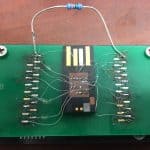Kingston DataTraveler DTSE9 monolith not detected
As capacities go up and costs go down for USB flash drives, people are using them to store more and more data.
However, the size and portability of these devices makes them prone to failure and often makes recovery difficult as well.
In this case, the user had stored critical Office files and family photos on their flash drive. One day she plugged the device in and it was not detected by the computer.
When Gillware received the device, engineers performed a full evaluation. They found that the device was a specific type of flash device called a monolith, which tends to make recovery even more challenging. Since the device was not detecting, it would require a full chip-off recovery and a manual rebuild of the file system.
Chip-Off Recovery
A chip-off recovery on a monolith flash drive is no easy task. Removing the chip itself is a challenge since everything is soldered together. In order to get the data off the NAND flash memory chip, it needs to be “spiderwebbed” on to a different board by carefully soldering wires between the chip and the board. And that’s just the half of it. Once the data is off the chip, it’s like a jigsaw puzzle dumped on the table. All the pieces are there, but they still need to be put together in order to turn the information back into recognizable files. Senior engineers were able to perform a manual rebuild of the file system in order to reconstruct the user’s data.

Kingston USB Flash Drive Recovery Results:
Fortunately, engineers were able to recover all of the user data in this case. Not everyone is so lucky in a difficult recovery such as this. So the moral of the story here is that flash drives should be used for file transfer only, not file storage. Never use a USB flash drive as the sole point of storage for any critical files. Be sure you keep copies in other locations, including a secure offsite backup.
